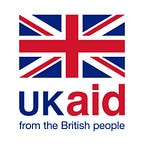Helping Syria’s disabled
How UK aid is working with Handicap International to support disabled and injured people affected by the conflict in Syria.
At first glance, 14-year-old Roqaya looks just like many other teenage girls her age.
She’s sitting on the sofa, busily tapping away on a smart phone, scrolling through her Facebook feed. She’s wearing trendy jeans and trainers.
She could be a teenager anywhere. In fact, she’s in a village in northern Jordan, just a couple of miles or so from the border with Syria. She’s one of the more than 600,000 Syrian refugees in Jordan.
When she talks, she’s slightly giggly at first; again, so far, so normal.
But when you realise what she’s talking about, and what happened to her, it’s remarkable that she’s so composed and confident. It’s remarkable that she’s even here.
“My mum and I were at home, talking on the phone, when a shell exploded nearby”, she says quietly.
“Mum was killed and I was injured”.
“I lost consciousness, and when I woke up I was in hospital here in Jordan.”
Roqaya’s matter-of-fact recounting of what happened makes it sound ordinary. She’d actually been very seriously wounded. Both of her legs had to be amputated at the knee. She didn’t know if she’d ever be able to walk again. She was evacuated across the nearby border into northern Jordan.
Not long after she‘d had initial treatment in a Jordan hospital, she was referred to the charity Handicap International, which is supported by UK aid.
Handicap International physiotherapists visited her in hospital and started supporting her recovery, providing physiotherapy sessions and arranging custom-made prosthetic legs for her.
Now, less than a year later, she’s walking independently again.
Watch Roqaya’s story
“I was afraid I wouldn’t be able to walk again at first”, says Ruqaya.
“And then, when I first received my new legs, I was afraid they were too heavy for me.
“But I have a strong personality, and I can walk normally now. I just want to walk, work and do everything as I used to do in Syria before the accident.”
A few miles down the road, in Irbid town, Amir, 27, is sitting up in bed, doing some exercises. He was also injured in an explosion in Syria in June 2014. He was helping people who’d been injured in an earlier incident when there was a second blast.
It left him paralyzed from the waist down. Like Roqaya, he was also evacuated to Jordan for emergency treatment.
“I didn't realise how bad my injuries were at first”, he said.
“When Handicap International first came to see me, I thought I would be better quite quickly. But now I realise it’s going to take a long time.”
Unfortunately, Amir’s injuries mean he is unlikely to be able to walk again.
But Handicap International’s physiotherapists and occupational therapists are visiting him once a week to help him and his family with exercises and training in how to move himself from his bed to his wheelchair. The charity has also provided Amir with an orthopaedic bed and a wheelchair to help in his recovery.
“I’m improving from session to session. I’m always surprised at how much I can do each time”, says Amir.
“I used to do bodybuilding, and now I exercise with my father helping me. I’m trying to stick to my routine.”
In the town of Ramtha, near to the Zaatari refugee camp, 67 year old Hassan has also been paralysed from the waist down — not that you’d know it from his infectious smile.
Hassan was a farmer in Syria. He suffered a spinal injury when he was struck by shrapnel from a bomb explosion near his home, and then fell from a first floor balcony to the ground in Syria in August 2014. He was evacuated to Jordan and now lives with his daughter, but his wife is still in Syria.
“When Handicap International came to see me, I didn’t feel like a patient anymore. I just felt like a person again”, he says.
He’s also been receiving physio and occupational therapy sessions from Handicap International’s mobile teams. Like most Syrian refugees, he’s desperate to go back to Syria.
“I had to leave my wife behind”, he explains.
“I need to go back in order to be with her and look after her. We've been married for 40 years, so what else can I do?”
“In the beginning I had no hope. But as the sessions have continued, I've started to get my strength back, and also my hope.”
“I was an active person before, so that’s why I’m doing so well now. I used to be a farmer, growing tomatoes. It was physical work”.
“I just want to be independent again, so that I can feed myself and go out on my own”.
“Without this support I would have gone back to Syria and been bed-ridden. Now I will be able to help my wife from the wheelchair”
Handicap International emergency teams are working in Syria, Jordan and Lebanon, providing support for injured, disabled and vulnerable victims of the conflict. Since the start of the crisis they've helped more than 360,000 people.
The UK is supporting Handicap International’s work with £7 million of humanitarian funding, meaning their mobile teams can keep visiting people like Roqaya, Amir and Hassan, to help them regain their independence and mobility.
To find out more about how the UK is helping support people affected by the conflict in Syria, please visit: www.gov.uk/uk-aid-syria
To support Handicap International’s work, please go to: www.handicap-international.org.uk
All photographs and video by Abbie Trayler-Smith/Panos for DFID.
